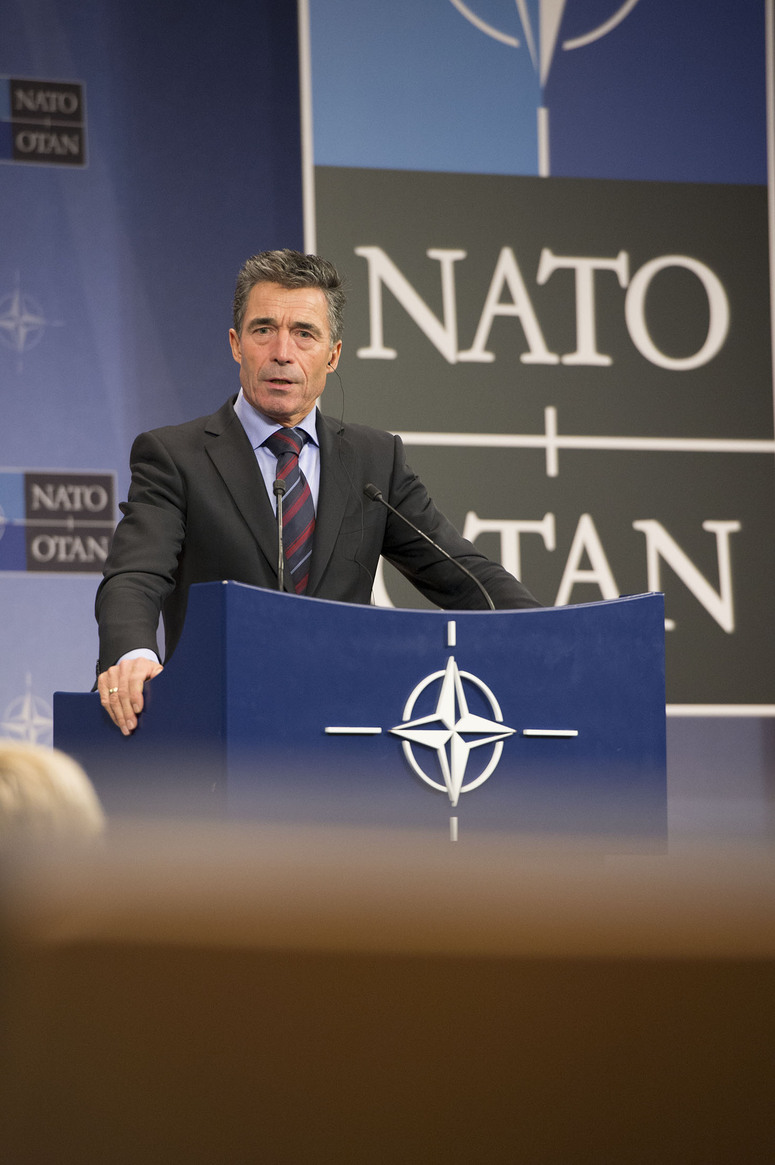Press conference
by NATO Secretary General Anders Fogh Rasmussen following the meeting of the NATO-Georgia Commission at the level of Foreign Affairs Ministers

We have just held our first meeting of foreign ministers in the NATO-Georgia Commission since the inauguration of Georgia’s new president.
Georgia is a unique and highly valued partner for NATO. And there is a lot that the Georgian people can be proud of.
This year’s elections, and the parliamentary elections last year, were free, fair and inclusive. Georgia’s democratic process continues to mature. And in that way, Georgia serves as a model for the wider region.
Georgian soldiers are serving their country and protecting our shared values in Afghanistan, side by side with Allied troops. And Georgia has offered to contribute to the NATO Response Force, in order to keep our troops connected for the future.
In the five years since we created the NATO-Georgia Commission, Georgia has moved closer to NATO. And together, we have made Georgia and the wider region a safer place.
There is of course, still work to be done.
I encourage the new government to continue to strengthen democracy. Cooperation between government and opposition will remain essential to carry on reforms.
We recognise Georgia’s achievements in making the democracy stronger, its judiciary more independent, and its defence and security sectors more transparent and more accountable.
We also look to the Georgian authorities to clearly and actively uphold the rule of law for all citizens.
We have also welcomed Georgia’s continued and patient commitment to peaceful conflict resolution. We reaffirmed our support for Georgia’s territorial integrity and sovereignty within its internationally recognized borders. We also expressed strong concern with the resumption of recent activities to erect fences and other obstacles along the administrative border lines within Georgia. We called for their removal, as they affect the lives of people and hamper conflict resolution.
Georgia’s ambitious reform agenda has an ambitious goal: integration into the Euro-Atlantic family, where Georgia naturally belongs. So I am confident that the new government will bring a new energy and a new momentum to our cooperation. And we stand firm by our decisions at the Bucharest Summit and will continue to support the Georgian people in fulfilling their aspiration for NATO membership.
With that, I am ready to take your questions.
ANDERS FOGH RASMUSSEN (NATO Secretary General): (...) And with that I'm ready to take your questions.
OANA LUNGESCU (NATO Spokesperson): There...
Q: Georgia Public Broadcast, Mister Secretary General, I want to ask you such a question. How do you think...? Is it possible to have good relationship with Russia on one hand; and on the other hand have ambition and desire to become more close... closer to NATO and then the member of NATO. Because in this room, several hours before, Russian minister made the same statement that NATO enlargement makes no one safe. And he was talking about cold war and etc. So how do you think? Is it possible?
ANDERS FOGH RASMUSSEN: Of course, it's possible. I mean many nations are at the same time members of NATO and they have an excellent relationship with Russia. I would argue that actually all 28 NATO Allies, at the same time, do have a special partnership with Russia. Let me just remind you that we have a very special forum, the NATO-Russia Council. Russia is the only country with which we have a special council. Within that council, we discuss many things: issues on which we agree. We discuss practical cooperation as well as issues where we disagree. It is a very special partnership. And there's no contradiction between being a member of NATO and at the same time being able to have such a relationship with Russia.
Yes, and that's actually my argument that the situation shouldn't... shouldn't be different, speaking about countries that aspire to becoming members of NATO. I strongly disagree with the position that NATO enlargement has contributed to more insecurity in the EuroAtlantic area.
On the contrary, through NATO's open door policy and through the enlargement of NATO the Alliance has contributed to developing a bigger and bigger sum of peace, security and stability in Europe, which, at the end of the day, is also to the benefit of the Russian Federation.
For centuries, Russia has looked for stability and security along her western borders. And that's exactly what the EU and NATO enlargement processes have provided.
OANA LUNGESCU: Second and last question over there.
Q: Broadcasting company Rustavi-2. My question will... hum...is such that: How can the current situation in Ukraine should influence the Georgia integration process...and the process to become a member of the NATO? And when many aired reports already speak about that official Moscow will boost the pressure to Georgia till it signs the Association agreement with the European Union?
ANDERS FOGH RASMUSSEN: It's my firm belief that events in Ukraine will not have an impact on Georgia's Euro-Atlantic aspirations. In that respect, let me remind you that Georgia and Ukraine have chosen two different tracks. Ukraine has stated that Ukraine will pursue a so-called non-bloc policy while Georgia has declared that Georgia aspires to becoming a member of NATO. And in today's NATO-Georgia Commission meeting, this aspiration was reaffirmed from the Georgian foreign minister.
And NATO ministers reaffirmed the decision we took in Bucharest in 2008 that Georgia will become a member of NATO, provided of course that Georgia fulfils the necessary criteria. So the bottom-line is that Ukraine and Georgia are two different cases and we have seen also the new Georgian government reaffirm its NATO aspirations.
OANA LUNGESCU: Thank you very much. Thank you.
